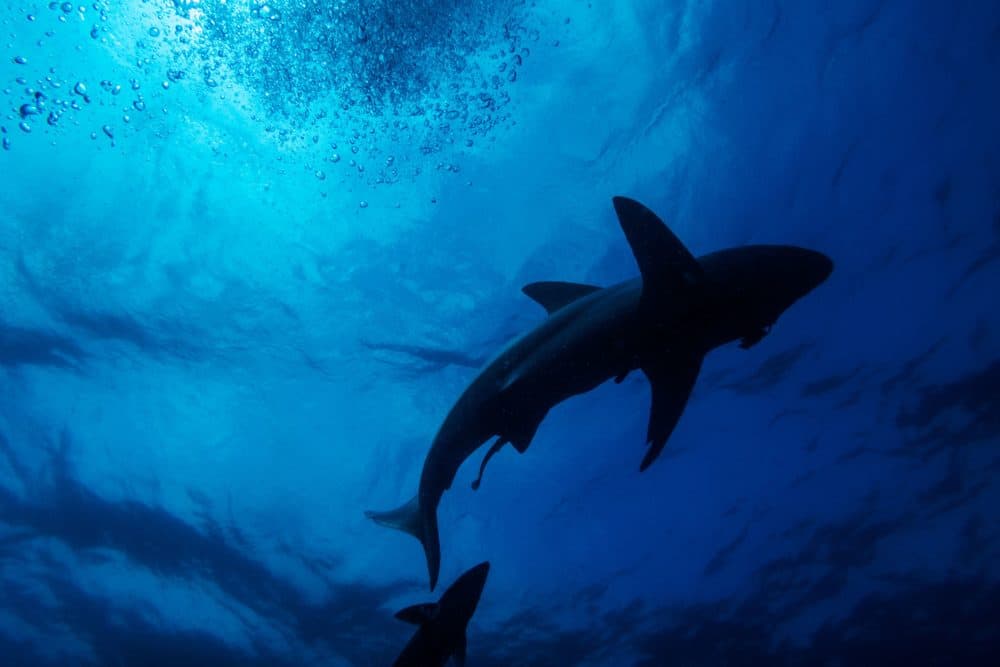Advertisement
Sharks aren't out to get you, even though 'Jaws' music makes it seem that way
Resume
Discovery Channel’s Shark Week starts Sunday as concerns over a number of shark sightings on both coasts rise.
Amid the shark talk, marine conservation scientist David Shiffman hopes people will reconsider how the animals are portrayed in media. Dubbed Shark Week’s biggest critic, Shiffman dives into his issues with the annual week of shows in his new book, “Why Sharks Matter: A Deep Dive with the World’s Most Misunderstood Predator.”
“[Shark Week] is a great idea. It's measurably … the largest increase in Americans paying attention to any ocean science or conservation issue of the whole year,” Shiffman says. “And they fill it with just nonsense. Sometimes it's harmful nonsense. Sometimes it's just useless nonsense.”
In 2013, Shark Week aired “Megalodon: The Monster Shark Lives,” a fake documentary where actors playing scientists searched for the existence of a prehistoric shark. The film received criticism for being misleading and Shiffman received threats for trying to debunk the film. He says it was just one of many low points for the series.
Misinformation about sharks makes it difficult to help them, Shiffman says, adding that the country needs to change how it interacts with the ocean or risk losing many shark species. But Shark Week focuses on things that don’t really matter, like a cast member of the reality show “Jackass” being launched into a frenzy of sharks and later bitten.
“I'm not saying that every documentary television series has to be a dry, boring, stuffy science lecture,” Shiffman says. “But it should talk about real things that are really important and talk about them in a way that's not full of lies.”
With a number of shark encounters occurring this summer, Shiffman prefers not to use the phrase “shark attack” to describe encounters with the creatures. The phrase shark attack might make some people picture the 1975 film “Jaws,” where a destructive shark wreaks havoc on a New England beach town.
In reality, sharks merely bump into people in the water and sometimes don’t physically touch them. While injuries can happen and sharks do kill people in some cases, Shiffman says there’s a greater chance of getting killed by falling from a cliff than a shark.
When beach-goers head into the ocean, Shiffman says there’s probably a shark nearby. However, with their senses, they’re able to detect humans.
“Just because you don't see a shark doesn't mean the shark doesn't see you,” Shiffman says. “And most of the time, they leave you alone … If you go in the ocean and you see a shark and it's just minding his own business, you do not need to be worried.”
Sharks, however, are in danger. Around 100 million sharks are killed a year, Shiffman says. Many die from unsustainable overfishing practices, intentionally targeting their fins and meat or through bycatch: accidentally catching a shark when you’re fishing for another fish.
By keeping the food web in balance, sharks help oceans and coastal ecosystems stay healthy. When sharks are targeted and the ocean is destabilized, it’s not just harmful to sea creatures, but to humans as well.
The release of “Jaws” profoundly affected how people view sharks. Before the movie came out, beachgoers didn’t think much about sharks — but now Shiffman says people tell him how terrified they are of going into the water.
The theme from the movie plays a part in the fear. Film music historian John Burlingame says film historians cite “Jaws” as one of the most terrifying scores ever written. During the production of the movie, director Steven Spielberg tasked composer John Williams with creating the score.
“It was then really up to John Williams to figure out how to make sure the audience understood that this was a terrifying, death-creating machine coming after you that you could not stop,” says Burlingame.
William’s concept was to create a rumbling in the bottom half of the orchestra with the lowest strings and brass instruments playing the iconic notes people are familiar with today.
“Williams really knew what he was doing, and he wrote this fairly simple orchestral idea and then made it work over the course of two hours,” says Burlingame. “So much so that now you can just play that music and people run screaming from the beach.”
Lynn Menegon produced and edited this interview for broadcast with Todd Mundt. Jeannette Muhammad adapted it for the web.
This segment aired on July 21, 2022.


